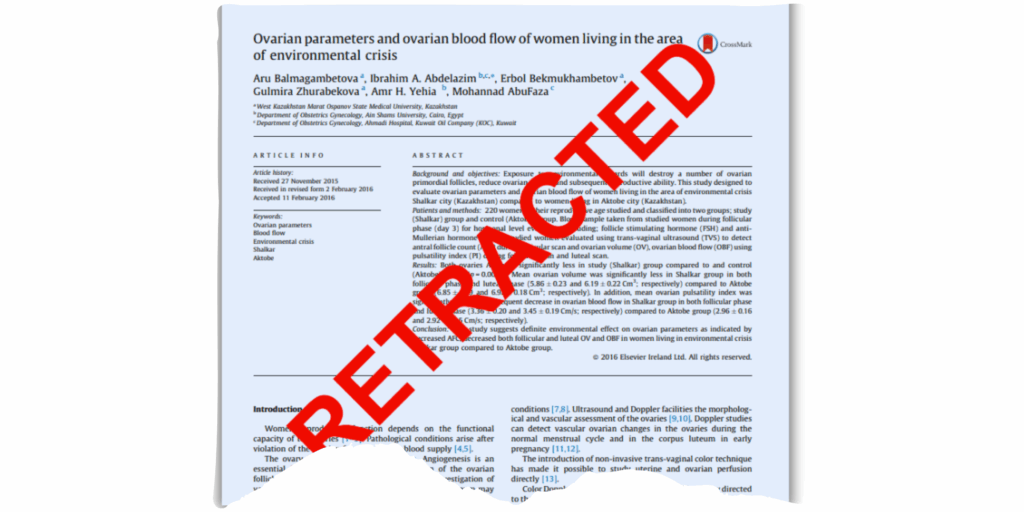
An obstetrician and gynecologist from an Egyptian university has garnered more than a half-dozen retractions so far this year for self plagiarism and problematic data.
Ibrahim A Abdelazim is on the faculty of Ain Shams University, Cairo, but is on “unpaid leave” and currently working at Ahmadi Hospital in Kuwait, he told us. The recent retractions bring his total to 10, along with one expression of concern. Several journals are conducting investigations into his other papers.
Published from 2012 to 2016, the retracted papers range from methods papers describing how to detect premature rupture of fetal membranes and how to sample endometrial tissue to a descriptive study of fertility after environmental crisis.
All 10 of the notices on the articles cite anomalous data or self plagiarism as the reasons for the retractions. Abdelazim did not answer our question about the pattern of data issues and plagiarized text in his comments to Retraction Watch, but he said he had been unable to provide ethical approval documents during the journals’ investigations.
Collectively, the papers have been cited 160 times, according to Clarivate’s Web of Science.
Ben Mol, a professor of obstetrics and gynecology at Monash University in Australia, flagged some of Abdelazim’s problematic papers on PubPeer. Mol is an experienced sleuth who has raised concerns about problematic research in the ob-gyn literature in the past. In correspondence we have seen, Mol contacted several journals about Abdelazim’s papers, some of which opened investigations.
One investigation into a paper published in the European Journal of Obstetrics & Gynecology and Reproductive Biology resulted in a 2024 retraction after the authors provided the raw data for the study. According to the retraction notice, “the provided files appeared incomplete and demonstrated biologically implausible distributions.”
Three of Abdelazim’s retracted papers were in Archives of Gynecology and Obstetrics, published by Springer Nature. “We were alerted to concerns with these papers thanks to a whistleblower, who contacted the journal,” said Tim Kersjes, head of research integrity, resolutions, at the company. According to the retraction notices, the 2022 retraction was for “serious anomalies” in the data, and the 2024 and March 2025 retractions were for self plagiarism.
In 2023, another of Abdelazim’s papers in Archives of Gynecology and Obstetrics was retracted, but a correction was issued in 2024 reinstating the paper. “Unfortunately, due to an administrative issue, a separate paper was accidentally retracted in error,” Kersjes told us. “We published a Publisher Correction to rectify this error and make it clear to our readers that this paper was not retracted.”
In March 2025, the Journal of the Turkish-German Gynecological Association, published by Galenos Publishing, retracted six of Abdelazim’s papers, three for anomalous data. The three identical retraction notices stated that after allegations were raised by a third party, “the Editorial Board identified unusual features in some of the reported data.”
The other three papers were retracted for self plagiarism, with one of the notices stating that “a methodological counterpart of this article was published in another journal shortly thereafter, with overlapping patient recruitment periods between the two studies.” After the authors “were unable to supply the original files” for any of the six papers and “considering the detection of other duplication cases by the corresponding author,” the Editorial Board retracted the six articles.
Neither the Journal of the Turkish-German Gynecological Association nor Galenos Publishing responded to our requests for comment.
In addition to the 10 retractions, one of Abdelazim’s papers in the Journal of Obstetrics and Gynaecology Research, published by Wiley, has an expression of concern due to potential self plagiarism. “Concerns about two manuscripts were raised by a third party in February 2024 and we initiated an investigation at that time,” a Wiley spokesperson told us. The investigation “revealed a partial redundancy, which was the focus of the corresponding EOC for the second manuscript.”
However, self-plagiarism may not be the only issue with those two papers. The Wiley spokesperson told us, “subsequently, we received additional concerns about the scientific content and reliability of these manuscripts.” They said the investigation is still ongoing.
Ginekologia Polska, a Polish gynecology journal, opened an investigation into Abdelazim’s papers published there, according to an email the journal sent Mol after he raised concerns about Abdelazim’s papers in the journal in April. Both the journal and its publisher, the VM Media Group, have not responded to our inquiries about the status of the investigation.
Abdelazim did not address our question about the pattern of retractions for anomalous data and self plagiarism. Instead, he gave an example of one paper retracted from the Turkish journal of the Turkish German Gynecological Association for a similarity between two papers. He went on to say:
The other papers were retracted because the publishing journals asked for the ethical committee approvals and raw data for those papers which were published within ≥10 years.
Regarding ethical approval, all retracted papers were conducted within ≥10 years and at that time, there was no ethical approval committee in the Faculty of Medicine, Ain Shams University. This committee launched in 2019-2020.
Regarding the raw data, we are not keeping the raw data for any studies conducted inside the Arab Republic of Egypt for more than 5 years, this is upon formal decision by ‘MEDICAL AND CLINICAL REGULATION LAW’ signed by the PRIME MINISTER OF EGYPT.
According to the Ain Shams University website, the Faculty of Medicine Research Ethics Committee was established in October 2007, contrary to what Abdelazim told us. An English translation of the cited law says researchers are required “to keep the documents of the medical research at the research facility at least 5 years” after writing the clinical study report, and “take sufficient precautions to protect the same from any loss or damage.”
According to the retraction notices, Abdelazim agreed with two of the retractions, did not respond to communications about two, disagreed with one, and the other five do not list whether he agreed.
Like Retraction Watch? You can make a tax-deductible contribution to support our work, follow us on X or Bluesky, like us on Facebook, follow us on LinkedIn, add us to your RSS reader, or subscribe to our daily digest. If you find a retraction that’s not in our database, you can let us know here. For comments or feedback, email us at [email protected].

I would really like the journals’ definition of “self-plagiarism.” This was a major topic of discussion on one editorial board I served on for some years. Does it apply to
(1) repeated descriptions of standard methods or those that are used across a series of related papers?
(2) Is it referring to reuse of text in results or discussion?
(3) Coverage of the same background literature in the intro sections?
(4) other textual repetitions?
With respect to #1, it’s can be really challenging to find different but equally clear and succinct ways of explaining how one collects and analyzes data across a series of studies. I’ve seen and deplored/flagged #2 but have no idea if #3 is even an issue.
This pubpeer entry provides the citation to one of the retracted articles and another to the paper that it “shows significant overlap with”. I don’t have access to the either paper, perhaps you can and then compare to see the self-plagiarism.
pubpeer.com/publications/7DE35EA307A5617945FEBBE76766A8
Can someone please define, and give an example of, “demonstrated biologically implausible distributions”?
Thanks